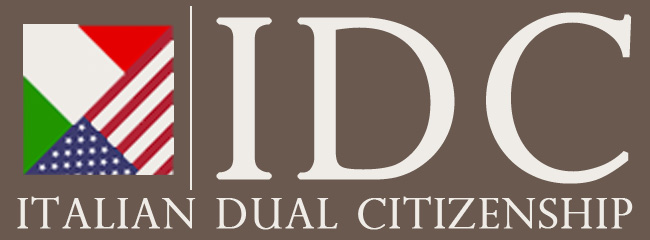Italian Citizenship By Descent (Jure Sanguinis)
APPLYING FOR ITALIAN CITIZENSHIP JURE SANGUINIS
What is Jure Sanguinis?
Jure Sanguinis (or Jus Sanguinis) is Latin for “right of blood” and is synonymous with “by descent”. Italy has favorable laws regarding citizenship and considers those of Italian descent “family”. In many cases Italy allows those with Italian ancestors to claim Italian citizenship by descent (Jure Sanguinis). Once a person is granted Italian birthright citizenship, they are allowed all of the rights and privileges of those born in Italy and can obtain a European Union passport. It provides full access to to Italy and all other 27 European Union member states.
Do you qualify for Italian citizenship by descent (jure sanguinis / law of blood)?
You very well could, as most people from Italian descent do qualify for Italian citizenship by birth. However, just having Italian ancestry is not enough. You must prove that citizenship, or more importantly the right to claim Italian citizenship, was transferred from your Italian-born ancestor to yourself within the Italian Laws. Until Aug. 15, 1992, Italian citizenship was exclusive, and attaining citizenship for another country meant an Italian-born citizen had to renounce their citizenship. Children born to Italian Citizens in the USA or other countries that recognize jure solis (by the soil) obtained foreign citizenship due to their place of birth. If you are trying to apply for citizenship by ancestry and are looking for a jure sanguinis service, our team can do the necessary background research free of both charge and obligation to tell you if you qualify for Italian citizenship by blood.

You can claim Italian citizenship through descent as Italy recognizes jure sanguinis (by the bloodline). However, you must prove that your Italian ancestor was, in fact, an Italian citizen or had the right to claim Italian citizenship when they were born. This blood right citizenship can then be passed onto their future generations down the bloodline.
Before March 17, 1861, there were no citizens of Italy as Italy was not a nation before this date. For a jus sanguinis citizenship application to be submitted, the oldest Italian ancestor must have still been alive on or after that date. A child born to an Italian citizen is afforded all the rights and benefits of being an Italian citizen so long as they qualify based on Italy’s laws, and that at least one of the applicants most recent Italian born ancestors did not naturalize as a citizen of another country prior the birth of their child next in the applicants bloodline.

Preliminary Research
Before you can apply for Italian citizenship jure sanguinis, you must know some important information:
- Date of births for every relative between you and your Italian-born ancestor (you don’t need to know exact dates but the year is important)
- Date in which your ancestor naturalized to your country.
Before you can begin the Italian dual citizenship process, you should make sure your current citizenship is not affected by the Italian citizenship. In the USA, it is not. The USA and several other countries allow you to hold more than one passport simultaneously. If you are outside of the USA and are unsure about your countries laws with regard to holding dual citizenship, you can review your citizenship laws or we can do this for you during your free phone consultation.
Four requirements that must be met to be eligible for Italian citizenship through descent:
- The applicant must be born to an Italian citizen parent or to a parent who has the right to Italian citizenship “jure sanguinis.”
- The applicant must be in direct blood lineage and at least one of the applicants most recent Italian born ancestors did not naturalize as a citizen of another country prior the birth of the Italian born ancestors child next in the applicants bloodline.
- Applicant’s mother was Italian and the child was born after Jan. 1, 1948.
- Ancestors who naturalized before June 14, 1912 are unable to transfer their citizenship even to children who were born before they naturalized.
When you apply for Italian citizenship by descent, the conditions and requirements must be met by each person in direct lineage when obtaining Italian citizenship through ancestry. According to Italian Ministry of Interior there is no limit in the number of generations, but the relative who immigrated from the country must have died after March 17, 1861. A relative that died before this date is not considered a citizen as Italy was not yet a unified nation.
We start every case with a free in-depth preliminary assessment to confirm your eligibility prior to taking on your case. If you qualify, we will work to identify the path that is the most efficient and successful.
Categories To Assist In Determining Eligibility
Your eligibility is affected by certain situations that fall under common categories. Bear in mind that some factors are not mentioned here and can positively affect eligibility for Italian citizenship. Even if your case doesn’t appear to fall within the eligibility criteria, you should still seek out professional assistance of an IDC team member as there are a number of factors that could have a positive effect on your case allowing you to qualify. Everyone’s ancestry is unique and we’ve often helped people qualify for Italian citizenship that previously were told they were not eligible. The Italian Consulates and Embassy cannot provide you with legal advice on obtaining Italian citizenship.
CLASS 1
When you were born, your father was a citizen of Italy. He did not naturalize as a citizen of any other country.
CLASS 2
When you were born, your mother was a citizen of Italy. She did not naturalize as a citizen of the US or any other country. Your birth-date was not before January 1st, 1948. It was after.
CLASS 3
Your father was not born in Italy, but his father or mother (your paternal grandfather or grandmother) was born in Italy and was a citizen of Italy or had rights to Italian citizenship jure sanguinis when your father was born.
CLASS 4
Your mother was not born in Italy, but her father or mother (your maternal grandfather or grandmother) was born in Italy and was a citizen of Italy or had rights to Italian citizenship jure sanguinis when your mother was born. Also, your birth-date cannot be before January 1st, 1948.
CLASS 5
Your paternal grandparent or maternal grandparent was not born in Italy. Your maternal and paternal great-grandfathers or great-grandmothers were born in Italy and were citizens of Italy or had rights to Italian citizenship jure sanguinis when your grandparents were born.
CLASS 6
Your paternal great-grandparent or maternal great-grandparent was not born in Italy. Your maternal and paternal great-great-grandfathers or great-great-grandmothers were born in Italy and were citizens of Italy or had rights to Italian citizenship jure sanguinis when your great-grandparents were born.
Due to the confusing nature of the Italian dual citizenship requirements, it’s important to reach out to our IDC team to see if you’re eligible to become a citizen. By doing so, you will learn if we can help you qualify for the many Italian citizenship benefits.
Restrictions
According to Italian nationality law, when applying by law of blood, if an Italian woman was your ancestor and she was not born after January 1st, 1948, then Italian citizenship can be granted to her children as long as they were born after January 1st, 1948. Several appeals have been made against this law. The High Court of Rome has held 7 trials for the appeals to be heard. 1948 cases are now very common. You can read more about 1948 cases here.
If you are claiming Italian citizenship for yourself, and your ancestor was born in Friuli-Venezia-Giulia, Trentino Alto-Adige, or Veneto you need to submit proof that you have an ancestor who was born in Italy but then left the country at some point after 07/16/1920 in order for you to qualify for citizenship in Italy.
If you have an ancestor who was born in Italy and later was naturalized in the United States before June 14th, 1912, and renounced their Italian citizenship. This renunciation of Italian citizenship would also apply to their underage Italian children who are residing in the United States or born in the United States.
To apply for Italian citizenship through blood, you must visit the appropriate Italian Consulate which has legal authority over the location where you are currently residing. There are varying procedures in every consulate, especially when it comes to scheduling appointments, the length of the waiting times, and the documents that you’re required to bring. Although, the legal requirements for getting Italian citizenship being granted by ancestry remain unchanged.
UPDATE: Regarding “Minor Issue” Law Change
There has been a lot of conversation recently regarding updates to how the Italian consulates will rule on cases which involve the “minor issue. To understand the “minor issue” we must first address the basics of Italian Citizenship Law as it provides the foundation for citizenship by descent cases. Law no. 555/1912, enacted on June 13, 1912, established that Italian citizenship is passed down by jure sanguinis, or “right of blood.” This means descendants of Italian born ancestors can seek and apply for recognition of their Italian citizenship, provided that there is an unbroken bloodline between the applicant and their Italian-born ancestor. At that time, acquiring another nationality meant automatically renouncing their Italian citizenship automatically and involuntarily—a rule that only changed when Law 91/1992 came into effect on August 16, 1992, allowing dual citizenship.
On October 3, 2024, the Italian Ministry of Interior issued updated guidelines clarifying that if an ancestor was naturalized while their child was still a minor, it would disrupt the transmission of citizenship to the child and future generations. This update has negatively impacted a large number of citizenship by descent cases leaving many people seeking a way around the recent law change.
Please see this page for more information on the developing topic.
Frequently Asked Questions:
What does jure sanguinis mean?
Jure sanguinis is Latin for “right of blood” and is the legislation that enables any individual to claim Italian citizenship by bloodline (descent). Whether this refers to parents, grandparents, great grandparents or distance relatives, once this individual can prove their ancestry ties to Italy, they may apply for citizenship.
What is law of blood?
“Law of blood” is synonymous with “Right of blood”. It is a term that is used for countries that grant citizenship by descent. Meaning if you have ancestry from that country that you can apply for and be granted citizenship based on your bloodline.
What is Italian citizenship by descent?
Italian citizenship by descent is possible for individuals who are born to Italian parents, grandparents, great grandparents (there is no upper limit in terms of the number of generations). Italian citizenship through descent can also be granted through the maternal line in the case of those born after January 1st 1948.
Do I qualify for Italian dual citizenship?
Confirming your eligibility for Italian dual citizenship depends if your most recent Italian born ancestors in any given bloodline ever naturalized as a citizen of another country before or after their child in the applicants bloodline was born. There are also several law changes through the years that must be properly navigated to confirm if you qualify.
How do I find out if I am a citizen of Italy?
If you have Italian ancestors, you can potentially qualify for Italian citizenship by blood (jure sanguinis). However, you must be able to prove these ancestral ties and the National Archive is a good place to begin this research. Alternatively, asking family members is often a good way to obtain information and start the process of finding out if you can potentially claim Italian citizenship.
Can I get an Italian passport if my mother is Italian?
If your mother was born in Italy after January 1st 1948, you may be able to apply for an Italian passport. However, you must also find out if your mother renounced her right to Italian citizenship as this is sometimes the case and a reason why you may not be entitled to an Italian passport.
Can I get Italian citizenship through my father?
Yes. If your father was born in Italy, you may be able to get an Italian passport. However, Italian law states that your father must not have renounced his right to Italian citizenship before your birth. For this reason, provided your father was not naturalized as a citizen of another country, you can apply for Italian citizenship which is the first step toward attaining a passport.
Can you get Italian citizenship through grandparents?
Yes. If your grandfather or grandmother was an Italian citizen or had rights to claim Italian citizenship at the time of your father or mother’s birth , you may be entitled to apply for Italian citizenship.
How can jure sanguinis become an Italian citizen?
If you qualify for Italian citizenship through jure sanguinis, you can complete a form and gather the required supporting documents for your application. After making an appointment and submitting these documents to your local Italian Consulate, you will need to wait for the consulate to make a final decision.
How many countries have jus sanguinis?
Most European, Asian, Oceanic and African countries grant citizenship via the jus sanguinis principle. For this reason, individuals who can prove their ancestral ties to these countries can apply for citizenship. However, slightly different rules apply to every country and these requirements should be checked in the respective consulate.
What countries have citizenship by descent?
In any country where citizenship can be attained through birth, you might be eligible to apply for citizenship by descent. More than 30 countries around the world facilitate this right to citizenship including Italy, Ireland, Canada, Brazil, Argentina and the United States. Some exceptions do exist so the requirements should be checked in the respective countries.
How to get EU citizenship through ancestry?
There are a handful of EU countries that allow you to apply for citizenship through ancestry. These countries all have individual rules and requirements to meet their standards for eligibility. Italy is one of the most lenient with no generational limits making it very popular for people to apply for Italian citizenship.
Which countries have jus sanguinis?
Jus sanguinis is Latin for “right of blood” and refers to countries that grant citizenship by descent. Currently 12 countries grant citizenship through jus sanguinis (the bloodline), Italy, Ireland, Philippines, Israel, India, France, Australia, Hungary, UK, Argentina, South Africa, and Turkey.
What is the difference between jus soli and jus sanguinis?
Jus soli is a principle that grants citizenship to any individual born within a particular country (on the soil). On the other hand, Jus sanguinis is a principle which enables an individual to claim citizenship through their parents, grandparents, great grandparents, or ancestors (by the bloodline). Most countries use at least one of these principles but some countries deploy a mixture of both laws when it comes to granting citizenship.
This page was last updated with help by Marco Permunian
Additional Resources:
- Italian citizenship benefits
- Italian citizenship jure sanguinis Brazil, Argentina and South America
- Applying for an Italian passport
- Become Italian citizen
- Italian dual citizenship cost
- Italian citizenship jure sanguinis Canada
- Requirements for Italian citizenship
- Italian citizenship jure sanguinis UK
- Italian citizenship through grandparents
- Italian citizenship through descent
- Italian citizenship marriage
- Italian citizenship by descent South Africa
- Italian citizenship jure sanguinis Australia
Contact Us
There are many ways to qualify for Italian citizenship jure sanguinis. Contact us at (213) 277-8705 to learn if you qualify.


